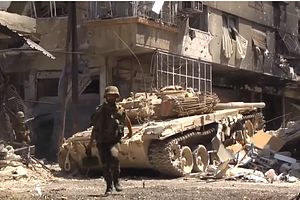With U.S. President Donald Trump assuming power, there are signals that he might essentially outsource the Syrian conflict to Russian President Vladimir Putin. However, this still leaves a difficult problem for both the United States and Russia: who will pay for the post-war economic reconstruction, at an estimated cost of $1 trillion dollars, in Syria after more than six years civil war? To some, China is a likely contender to take on that role.
It seems that China has both the political willingness and economic capability to cover expenses that the international community — especially Russia, Iran and Syria — will need to help Syria’s economic reconstruction. In return, China would play a major economic role in Syria.
Politically, China has been standing with Russia, Iran, and the Syrian government by upholding the slogan of “non-intervention” and emphasizing a “political solution” rather than a “military solution” since the Syrian Civil War broke out in 2011. China’s concerns in Syria are influenced by domestic factors. On the one hand, China worries that Islamic extremism could expand from the Syrian war zone into China’s western provinces, such as Xinjiang and Ningxia, where the Uyghur, Hui, and Chinese Muslim populations are concentrated. The long-lasting civil war has provided Islamic extremists, including many Uyghur extremists from China, a place to train and fight. China fears these Islamic extremists may eventually return to threaten China’s domestic safety.
On the other hand, China worries that the victory of Syrian rebels who fight in the name of “democracy” and “freedom” would provoke internal social and political unrest in China, which could threaten the Communist Party’s regime. Against this backdrop, it is essential that China stands with Russia and Iran to “safeguard” the Syrian government in the international arena. That support could logically be expected to extend to the post-war rebuilding period as well.
Economically, China has the economic capability to help and to play a major role in the post-Syrian-war construction. Under the One Belt, One Road (OBOR) initiative put forward by Chinese leader Xi Jinping in 2013, China’s economic expansion abroad has increased significantly. Many Chinese state-owned enterprises have purchased companies from and invested in different foreign states, demonstrating China’s economic ambitions. Meanwhile, China has established several international organizations, such as Asian Infrastructure Investment Bank (AIIB), in the hope of reforming the existing international economic system. With China expanding both its economic and political ambitions abroad, taking a leading role in Syria seems like a golden opportunity. The massive amount of foreign currency reserves (more than $3 trillion) held by China seems enough to cover the expenses needed for post-Syrian war reconstruction.
However, despite these factors, it is not likely that China will play a major economic role in Syria’s post-war economic reconstruction. Although China has the capability to cover the expenses, its political and economic interests in Syria do not necessarily mean China will be a major “investor” in post-Syrian society.
First, China’s political willingness is limited. China’s major political interests in Syria are majorly concerned with the containment of Islamic extremism. Although the “ideology” factor was a concern for China in the early stages of the civil war, Syria’s deteriorating social order and foreign interventions have made its “democracy revolution” less attractive for the Chinese public. Meanwhile, it would be dangerous for China to play a major role in Syria. By doing so, China could make itself into a major target for global Sunni extremists, as China’s help and construction for Assad’s Shia-dominated regime could provoke dissatisfaction among Sunni extremists.
Meanwhile, China has to be cautious not to appear to threaten either Russia and Iran, who have deep interests in Syria. Although business is business, economic expansion abroad may translate into political power and influence. China, although actively spreading its OBOR initiative, is cautious not to provoke opposition from other regional and global powers, especially Russia and Iran. For China, Russia’s influence in Central Asia and Iran’s influence in Gulf should be respected. Any move toward Chinese economic dominance in Syria would, at least to some extent, challenge the bilateral ties between China-Russia and China-Iran.
Finally, China’s economic capability has declined significantly in recent years. Just a few years ago, in 2013 when Xi Jinping assumed power, China’s foreign currency reserves were more than $4 trillion. However, after years of OBOR investments overseas, China’s foreign currency reserves have declined to $3 trillion. Although this is the cost of the economic expansion globally, rapid dwindling of foreign reserves ha still shocked many Chinese. In addition, given the poorly managed and inefficient nature of China’s state-owned companies, many mega-projects and big investments in foreign states by Chinese state-owned companies end up working as money laundering machines for many Chinese embezzlers. Although Chinese political leaders are still interested in the OBOR initiative, they cannot overlook these concerns. Thus it is unlikely that China would spend huge amount of money in Syria after the civil war.
China’s interests in Syria do not necessarily translate into a major role in reconstruction after the Syrian Civil War. Although China harbors economic interests, especially in Syria’s natural resources, and has been coordinating well with the Syrian government, Russia, and Iran, it is still unlikely that China would play a major economic role in post-war Syria, given both China’s political concerns and its shrinking foreign currency reserves.
Wang Jin is a PhD candidate at the School of Political Science, University of Haifa.

































